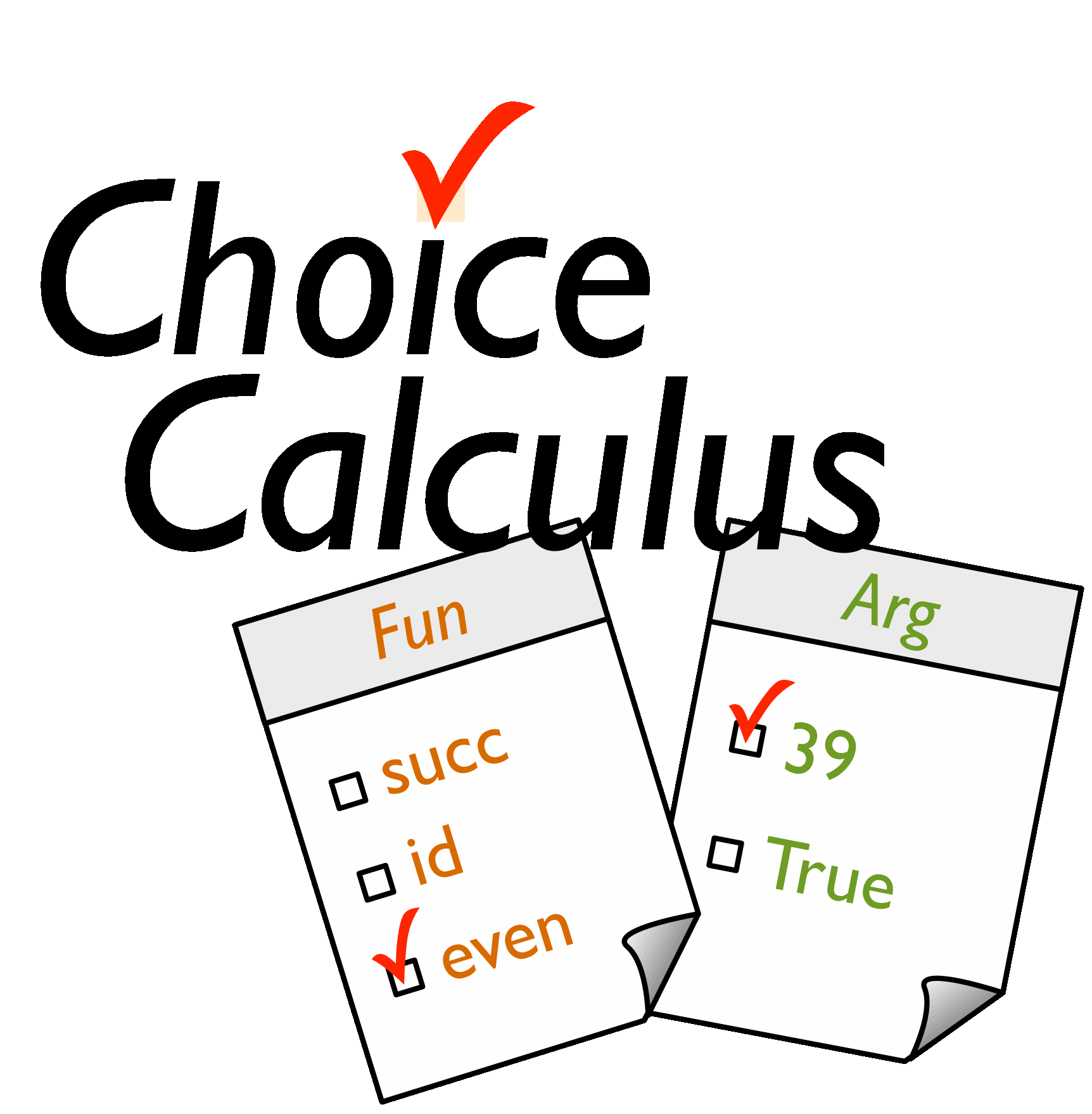
Managing variation is an important problem in software engineering that takes different forms, ranging from version control and configuration management to software product lines. Our current work in this area focuses on the choice calculus, a fundamental representation for software variation that can serve as a common language of discourse for variation research, filling a role similar to lambda calculus in programming language research.
The choice calculus obeys a rich set of laws that give rise to a number of normal forms and allow the flexible restructuring of variation representations to adjust to the needs of different applications.
Among the potential applications of the choice calculus are feature modeling, change pattern detection, property preservation, and the development of change IDEs. We have also successfully applied the choice calculus in the development of type systems for variational languages and in the design of type systems that produce better type error messages.
A Calculus for Variational Programming,
Sheng Chen, Martin Erwig, and Eric Walkingshaw
European Conf. on Object-Oriented Programming,
LIPICS Vol. 56, 6:1-6:28, 2016.
Exploiting Diversity in Type Checkers for Better Error Messages,
Sheng Chen, Martin Erwig, and Karl Smeltzer
Journal of Visual Languages and Computing,
2016, to appear
Principal Type Inference for GADTs,
Sheng Chen and Martin Erwig
ACM SIGPLAN-SIGACT Symp. on Principles of Programming Languages,
416-428, 2016
Variational Typing and Its Applications,
Sheng Chen
Doctoral Thesis, Oregon State University,
2015
Type-Based Parametric Analysis of Program Families,
Sheng Chen and Martin Erwig
ACM SIGPLAN Int. Conf. on Functional Programming,
39-51, 2014
Variational Data Structures: Exploring Tradeoffs in Computing with Variability,
Eric Walkingshaw, Christian Kästner, Martin Erwig, Sven Apel, and Eric Bodden
ACM SIGPLAN Int. Symp. on New Ideas, New Paradigms, and Reflections on Programming & Software (Onward!),
213-226, 2014
Projectional Editing of Variational Software,
Eric Walkingshaw and Klaus Ostermann
ACM SIGPLAN Int. Conf. on Generative Programming and Component Engineering,
29-38, 2014
Let's Hear Both Sides: On Combining Type-Error Reporting Tools,
Sheng Chen, Martin Erwig, and Karl Smeltzer
IEEE Int. Symp. on Visual Languages and Human-Centric Computing,
145-152, 2014
Guided Type Debugging,
Sheng Chen and Martin Erwig
Int. Symp. on Functional and Logic Programming,
LNCS 8475, 35-51, 2014
Counter-Factual Typing for Debugging Type Errors,
Sheng Chen and Martin Erwig
ACM SIGPLAN-SIGACT Symp. on Principles of Programming Languages,
583-594, 2014
Early Detection of Type Errors in C++ Templates,
Sheng Chen and Martin Erwig
ACM SIGPLAN Workshop on Partial Evaluation and Program Manipulation,
133-144, 2014
Extending Type Inference to Variational Programs,
Sheng Chen, Martin Erwig, and Eric Walkingshaw
ACM Transactions on Programming Languages and Systems, Vol. 36,
No. 1, 1:1--1:54, 2014
An Abstract Representation of Variational Graphs,
Martin Erwig, Eric Walkingshaw, and Sheng Chen
ACM Int. Workshop on Feature-Oriented Software Development,
25-32, 2013
The Choice Calculus: A Formal Language of Variation,
Eric Walkingshaw
Doctoral Thesis, Oregon State University,
2013
Adding Configuration to the Choice Calculus,
Martin Erwig, Klaus Ostermann, Tillmann Rendel, and Eric Walkingshaw
ACM Int. Workshop on Variability Modelling of Software-Intensive Systems,
13:1-13:8, 2013
Variation Programming with the Choice Calculus,
Martin Erwig and Eric Walkingshaw
Generative and Transformational Techniques in Software Engineering,
LNCS 7680, 55-100, 2013
An Error-Tolerant Type System for Variational Lambda Calculus,
Sheng Chen, Martin Erwig, and Eric Walkingshaw
ACM SIGPLAN Int. Conf. on Functional Programming,
29-40, 2012
A Calculus for Modeling and Implementing Variation,
Eric Walkingshaw and Martin Erwig
ACM SIGPLAN Conf. on Generative Programming and Component Engineering,
132-140, 2012
The Choice Calculus: A Representation for Software Variation,
Martin Erwig and Eric Walkingshaw
ACM Transactions on Software Engineering and Methodology, Vol. 21,
No. 1, 2011, 6:1- 6:27
#ifdef Confirmed Harmful: Promoting Understandable Software Variation,
Duc Le, Eric Walkingshaw, and Martin Erwig
IEEE Int. Symp. on Visual Languages and Human-Centric Computing,
143-150, 2011
Optimizing the Product Derivation Process,
Sheng Chen and Martin Erwig
IEEE Int. Software Product Line Conference,
35-44, 2011
Program Fields for Continuous Software,
Martin Erwig and Eric Walkingshaw
ACM SIGSOFT Workshop on the Future of Software Engineering Research,
105-108, 2010
A Language for Software Variation,
Martin Erwig
ACM SIGPLAN Conf. on Generative Programming and Component Engineering,
3-12, 2010
GTTSE2011.zipYou need a recent version of the GHC Haskell compiler, or even better the Haskell Platform, to use the code.
How to use the program: Download the zip file, and unzip it. This will create a directory GTTSE. Change to that directory and load one of the example files into ghci by executing, for example, ghci Examples/List.hs.
| last change: July 21, 2016 | Martin Erwig erwig@oregonstate.edu |